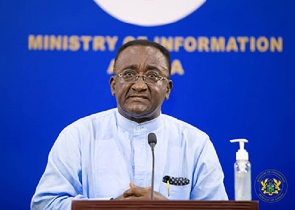The Ministry of Food and Agriculture is in the process of developing a Post Covid-19 strategy to be aligned with government's COVID-19 response programme.
The strategy, which is still at the consultative stage, will assess the effect of the pandemic on the agricultural sector.
Madam Josephine Quagraine, Deputy Director, Policy Planning and Budget Directorate, Ministry of Food and Agriculture, speaking at a public forum, said the strategy defines interventions to improve food supply chains in the short term (June 2020 –December 2021) as well as medium to long term actions to build resilience.
The forum, organised by Peasant Farmers Association of Ghana (PFAG) in collaboration with SEND Ghana and with support from the International Budget Partnership, was held under the theme: Anchoring Ghana's Post-COVID Recovery on Agriculture: Investing in Smallholder Farmers for Food Security and Growth".
It served as a platform to discuss the impact of COVID-19 on the economy as a whole and justify the prioritization of agriculture as the engine to propel Ghana out of economic quagmire due to the COVID.
She said the strategy also has a Medium - Long term interventions that would be incorporated into the next medium term plan (2022 – 2024) as well as the new sector policy being developed.
She said the effects of the pandemic on agricultural sector include food availability (imports and local production), food access, utilization, food price stability, agribusinesses and exports.
On the short term measure, the Deputy Director said, it would focus on strengthening food production programmes to ensure there that is no food deficit and to enhance access to inputs for 2020 planting season.
Madam Quagraine said one other strategy was to enhance access to finance for crop and livestock producers and processors, which would provide technical assistance to banks to apply their expanded pool of funds to finance actors in the maize, rice, soy and poultry supply chains.
She said with this strategy, they would improve extension delivery, expanding access to information, while intensifying the use of electronic media (TV and radio) to enhance extension delivery.
She said under promoting production of high value vegetables under greenhouse environment, the Ministry would facilitate contract farming with off-takers to secure markets; organize youth into production, marketing and input supply agri-businesses by providing matching grants to 500 youth to acquire 100-unit greenhouses; 50 youth in fresh vegetable marketing and 50 youth to establish input supply businesses.
"And train 200 youth and 500 Extension Agents on Greenhouse production protocols," she added.
Professor Godfred Bokpin, an Economist speaking on agriculture sector led-economy recovery, said, the country has moved from contentment to living with the virus.
He said the impact of the COVID-19 has elevated inequality and made a lot of people vulnerable during the period.
He called on government to scale up agriculture spending as a necessity and open up the entire sector and its value chain saying "scale up agriculture Sector Investment Fund".
He urged government to improve and scale up efficiency in existing agriculture sector interventions such as subsidy on fertilizers among others.
Mr Bismark Nortey, a Programme Officer, PFAG, said the forum was also to provide a platform to discuss the strategic direction by the Ministry in mitigating the effects of COVID on agriculture.
He said the forum was used to elicit inputs for consideration into the upcoming mid-year budget review to be presented by the Ministry of Finance.
Click to view details



Business News of Monday, 6 July 2020
Source: GNA

















